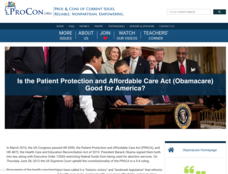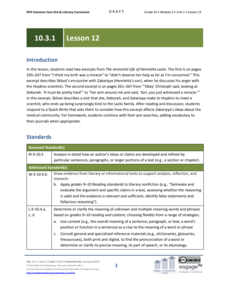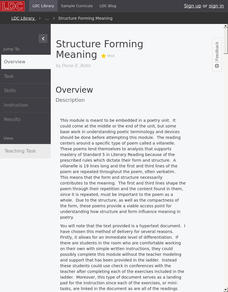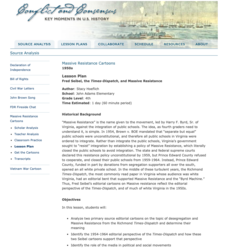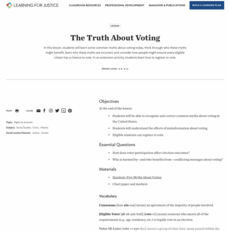ProCon
Illegal Immigration
Should immigrants who illegally reside in the United States be eligible for citizenship? With information about undocumented immigrant population estimates, sanctuary cities, and unaccompanied immigrant children, pupils consider the pros...
ProCon
Gold Standard
If all the mined gold in the world was melted across a football field, it would rise 5.4 feet. That's just one interesting fact pupils learn when using the debate topics website to determine if the United States should return to a gold...
ProCon
Obamacare
Former President Barack Obama reformed the United States' health care system with Obamacare, but is the new legislation good for America? Scholars read a historical timeline about the passage of health care reform laws and compare United...
ProCon
Obesity
Is obesity a disease or just a preventable risk factor for other diseases? Scholars attempt to form their own opinions by reading a background of the issue and watching videos that explore the main pro and con arguments using an included...
ProCon
School Uniforms
Americans spend around one billion dollars each year on school uniforms, but are they necessary? As pupils research the debate topic, they form their own opinions. They review the history of school uniforms and discover the top pro and...
ProCon
Student Loan Debt
Should college loan debt be easier to discharge in bankruptcy? Scholars sort through the top three pros and cons to decide for themselves in preparation for a class debate or discussion. Learners may also participate in an online poll to...
EngageNY
Grade 10 ELA Module 3: Unit 1, Lesson 12
First impressions are crucial. Scholars read two excerpts from The Immortal Life of Henrietta Lacks. One describes the family's negative opinion of the hospital, while the other discusses their meeting a very kind doctor. Learners work...
ProCon
Voting Machines
Does technology always mean advancement? Scholars take a close look at the use of voting machines. Does using a machine make voting more effective? Readers consider the advantages and disadvantages of the current voting process. They...
Literacy Design Collaborative
Structure Forming Meaning
Teach literary lovers how to form opinions about form. Scholars read
informational text about the form used in villanelles. After analyzing
the structure used in the poetry with graphic organizers and gallery
walks, writers create...
Literacy Design Collaborative
The Sunflower: The Possibilities and Limitations of Forgiveness
After reading Simon Wiesenthal's The Sunflower, pupils form opinions either for or against forgiveness as well as analyze Wiesenthal's choice about forgiving. Before completing their essays, learners participate in class discussions to...
EngageNY
Grade 10 ELA Module 4: Unit 3, Lesson 5
Would Machiavelli consider Macbeth a successful ruler? Scholars ponder the intriguing question, demonstrating their knowledge of Shakespeare's Macbeth and Machiavelli's The Prince. They collaborate with peers to share their opinions,...
Roy Rosenzweig Center for History and New Media
Fred Seibel, the Times-Dispatch, and Massive Resistance
A lesson plan challenges scholars to analyze editorial cartoons created by Fred Seibel, illustrator for the Times-Dispatch, during the Massive Resistance. A class discussion looking at today's editorial pages and Jim Crow Laws leads the...
EngageNY
Mid-Unit Assessment: On-Demand Writing – Conflicting Interpretations of the 13th and 14th Amendments
The authors of the court's decision and the dissenting opinion on Plessy v. Ferguson disagreed on their interpretations of the Thirteenth and Fourteenth Amendments. Scholars set out to show how with an on-demand writing prompt. They...
Teaching Tolerance
Buddy Share
Here's a project that gives academics the chance to share their opinions on social justice with storytelling, creative writing, or art. Scholars choose what they want to create and are assigned buddies to support their efforts. To...
EngageNY
Studying Conflicting Interpretations: Perspectives on Plessy v. Ferguson: Part 3
Scholars closely read Justice John Marshall Harlan's dissenting opinion in the Plessy v. Ferguson case, seeking to understand why he disagreed with the court's decision that racial segregation laws for public spaces were constitutional....
EngageNY
Using Routines for Discussing A Long Walk to Water and Introducing Juxtaposition (Chapters 9 and 10)
Take a stand. Scholars consider what it means to take a stand in A Long Walk to Water. They complete an activity by taking a stand and moving to a labeled section of the room that matches their opinion. Readers then examine text features...
K20 LEARN
Government and Your Right To Vote: Voting Rights In America
Gaining voting rights was difficult over the course of decades, but the debate over who should actually be allowed to cast a ballot remains. Scholars explore the history of the struggle, including the fifteenth and nineteenth amendments,...
University of Waikato
Farming and Environmental Issues
Forming ethical arguments is sometimes a complicated task. Guide classes through a process for forming and presenting ethical opinions. Learners consider the views of all stakeholders on the impact of farming on the environment and the...
Missouri Department of Elementary
How We Are Alike And Different
Scholars develop social awareness by exploring the concept of similarities and differences. Learners examine two beverages and use a Venn diagram to identify similarities and differences. They tally each item to identify if they are more...
Encyclopedia Britannica
Presidential Electability
There are specific constitutional requirements that candidates must meet to become president of the United States. In addition, there are societal opinions that affect a candidate's electability. Class members examine historical...
Teachers Network
Witness for the Prosecution: Online Newspaper
Agatha Christie's Witness for the Prosecution becomes the text for an online newspaper activity. Young journalists craft news, features, obituary, and opinion articles based on the characters and events in the play.
Teaching Tolerance
The Truth About Voting
True or False: Only Presidential elections matter. Academics delve into common voting myths to understand what is true and why the election process is critical to democracy. The lesson uses group discussion, activities, and handouts to...
Teaching Tolerance
Jim Crow as a Form of Racialized Social Control
Just because slavery was illegal doesn't mean it went away ... Jim Crow Laws took its place. An eye-opening lesson focuses on how Jim Crow Laws were used as a form of racial social control against African Americans in the United States....
DocsTeach
Twelve Years a Slave
It's difficult to truly grasp the effects of slavery. Young historians use historical analysis to understand the struggle of slavery on African Americans. The resource provides text from the autobiography Twelve Years a Slave to help...
Other popular searches
- Fact and Opinion
- Fact Opinion
- Fact Opinion Lesson Plans
- Fact or Opinion
- Fact vs. Opinion
- Fact and Opinion Passages
- Fact Opinion Worksheet
- Fact and Opinion Lessons
- Opinion Writing
- Teaching Fact vs. Opinion
- Fact vs Opinion
- Fact and Opinion Worksheets




